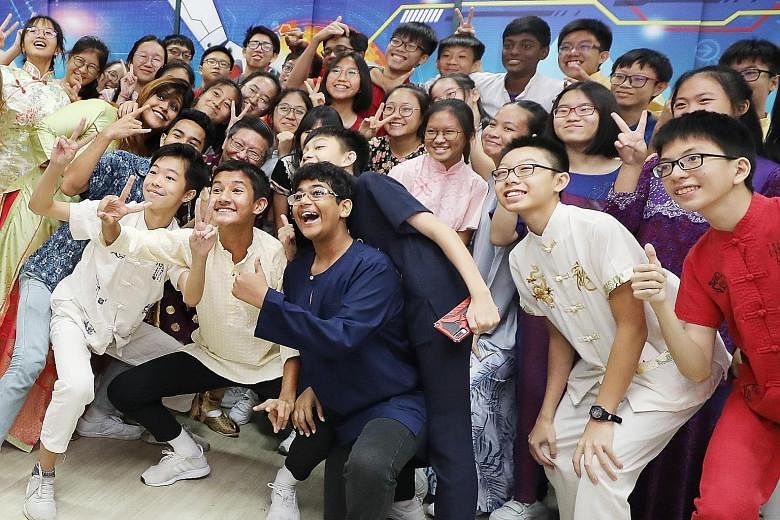Singapore has not reached a post-racial state, so there are strong government efforts and strict laws to ensure racial and religious harmony.
But going forward, younger Singaporeans must decide where to draw the boundaries on discussions on race and religion, and lead ground-up efforts to bring these difficult conversations into their respective communities, said Law and Home Affairs Minister K. Shanmugam yesterday.
In his opening remarks at an online dialogue organised by OnePeople.sg, a national body that promotes racial and religious harmony, Mr Shanmugam said the framework within which Singapore has handled race relationships has worked well.
For example, in a 2016 Gallup World Poll, Singapore ranked top out of more than 140 countries for tolerance of ethnic minorities.
But race and religion remain fault lines and are emotive issues, and conversations must be managed with care, Mr Shanmugam said.
"Just because you have discourse, doesn't mean you're going to automatically find the answers. You need the discourse, but you need it in a safe environment. At the same time, the Government needs to take action against people who are agitating or fomenting racial discord."
Addressing about 120 young people, he said that while there are strict laws in place - such as the Maintenance of Religious Harmony Act, which was updated last year - it is important for younger Singaporeans to come forward and set up community-led initiatives, and the Government will be happy to support them.
"We will empower you, even if it's just 10, 50 people working together to try and bring about change. We can talk about racism, we can talk about class consciousness, and we can propagate these ideas into your communities," he said.
"It must be led by you, not the Government. The Government can help and support, but we need you to come in too."
He also urged them to think about how they want to handle racial sensitivities going forward, bearing in mind that this is a difficult issue all around the world.
"Even in Latin America, with the same religion and same race, there is a differentiation between those who are lighter and those who are darker-skinned. So you get this (discrimination) in many ways, and you're not going to eradicate it."
Mr Shanmugam acknowledged that while older Singaporeans are less comfortable discussing race issues in public, younger Singaporeans are more willing to have such conversations.
"The only question is whether there should be boundaries. What do you think should be the limits of offensive speech, or speech that runs down other races or religions? Our current position is 'nothing' - you cannot make derogatory remarks," he said.
But if younger Singaporeans think the current approach should be changed, they may also want to consider whether there is a difference between ethnic minorities using racial epithets and slurs against ethnic majorities, versus the other way around, he said.
They must also think about the potential trade-offs. "Based on what our young people think, then we'll have to decide what our laws ought to be," the minister said.
A dialogue participant, citing recent incidents involving Ms Raeesah Khan of the Workers' Party and local YouTuber Preetipls, suggested that minorities here may perceive unequal treatment by the law.
He pointed out that a controversial rap video last year - made by Ms Preeti Nair, known as Preetipls, in response to a "brownface" advertisement - was taken down, while the ad itself was given a stern warning.
The regulators had said that while the ad did not breach the Internet Code of Practice, it was done in poor taste and caused offence to minorities.
Mr Shanmugam explained that the brownface ad was not a criminal offence, as whether a Chinese actor plays an Indian, or an Indian plays a Chinese, is not something that the authorities prevent.
For example, a Chinese contractor in the local comedy series, Phua Chu Kang, was played by Gurmit Singh, an actor of Punjabi heritage.
What the law prevents, Mr Shanmugam said, is people saying "nasty" things, such as using four-letter words against other races.
"Do we want that? What do you think should be the limits?
"And I mean it in all seriousness, because young people have to decide what the nature of the discussion should be."
On Deputy Prime Minister Heng Swee Keat's remarks at a forum last year that Singapore is not ready for a non-Chinese PM (prime minister), another participant asked how he could justify this to his friends, that it is only a statistic, and not the Government's official position.
Mr Shanmugam said that his vision is of a Singapore where the colour of one's skin does not matter when people think of a PM.
"That is the ultimate ideal of a meritocratic society, and one where we have the highest ideals of multiracialism," he said, adding that the key consideration should be whether the person can do the job.
"It shouldn't matter what your skin colour is and what your culture is, because you're Singaporean first."
He also said DPM Heng's comment should be taken in context. A 2016 survey by the Institute of Policy Studies found that the majority of Singaporeans prefer the country's top leaders to be of the same race as themselves, with the sentiment markedly stronger among respondents aged 50 and above.
Mr Shanmugam asked young people to share more of their views, with OnePeople.sg to facilitate another dialogue later this year.
He also challenged them to reach out to their own communities, such as by forming groups to engage fellow students on race attitudes and the kind of language they want to see in these conversations.
"Our task is to work towards having a change of these perceptions, where race matters less and less, and we become colour blind, a post-racial society - we're not there yet," he said.
"It will require hard work by the Government and everyone who is interested in these issues."


